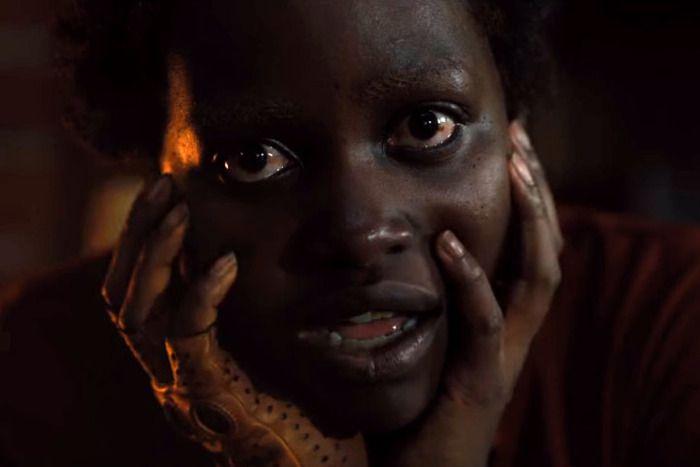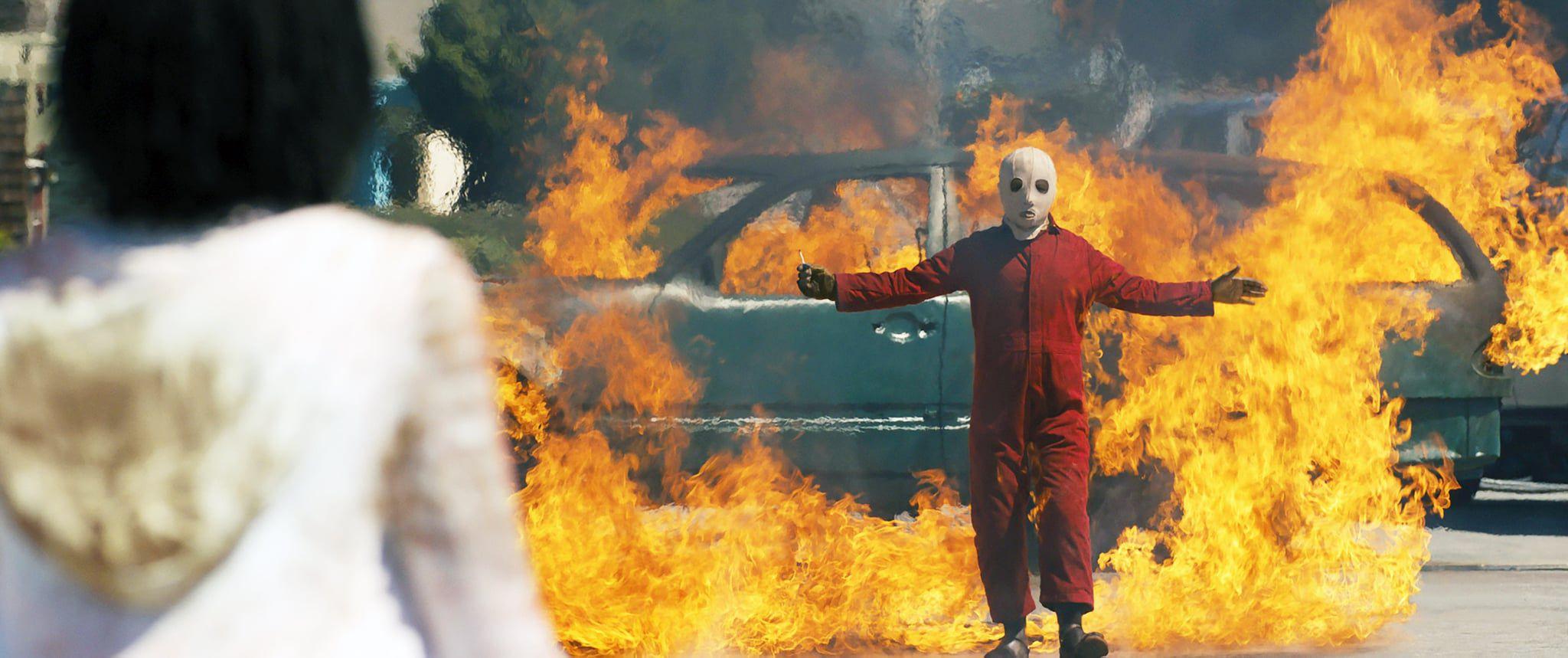With Us hitting theaters this past weekend, two things are certain: Jordan Peele is one of the most commercially viable directors in Hollywood, and no one will ever look at a rabbit the same again. There’s a lot to talk about and maybe not much time until the doppelgänger-led apocalypse, so let’s get to it: Here is the Us exit survey.
1. What is your tweet-length review of Us?
Kjerstin Johnson: Hell is an abandoned ’80s shopping mall.
Miles Surrey: I eagerly await the next installment in the SPCU (Sewer People Cinematic Universe).
Lindsay Zoladz: As a visually dazzling horror film? Good! As a follow-up to Get Out? A little disappointing, sorry.
Andrew Gruttadaro: An extremely fun, visually dynamic movie that makes you think a lot—even though it might be better if you don’t think about it at all.
Micah Peters: Lupita Nyong’o doing severely dehydrated Elizabeth Holmes >>>>>>> Elizabeth Holmes.
Donnie Kwak: “OK, now something cool will happen …” —Me, patiently waiting for two hours, to no avail—but I guess I have to see it twice?
Alison Herman: It’s much more engaging to watch than it is to think about, which makes it the perfect inverse of Get Out. The acting, filmmaking, and manipulation of tension are superb; the payoff and messaging less so.
Kate Knibbs: I love it when horror movies remind us that people with beach houses are not to be trusted.
2. What was the best moment of the film?
Gruttadaro: When Tim Heidecker and Elisabeth Moss’s family gets killed by their doppelgängers. First of all, showing the slaying from outside the house had an incredible effect, but this is also the moment when you realize that the scope of the movie goes far beyond one family. It’s delightfully shocking.
Peters: The final “dance” between Adelaide and Edialeda, which I’ve decided is a cooler/more distinctive name than “Red.” In any case, when Lupita lunges at Lupita with the stoker poker, and Lupita then levels Lupita with the school desk before stabbing Lupita’s hand with the scissors and slapping Lupita? Man, that was some compellingly disconcerting and confusing cinema.
Knibbs: When Zora stops to catch her breath and you see Umbrae run into the frame. SPOOKY!!!
Johnson: I enjoyed the entire Tyler family murder scene. From “Ophelia, give me some Beach Boys” to Heidecker’s zombie “gotcha” move to the twins’ Exorcist-meets–The Shining look. It was the perfect chaser to the first act’s heart-racing home invasion and some sanctioned levity before the truly sinister stuff kicked back in.
Surrey: The middle third of the movie—when the Wilsons fight their doppelgängers, as well as those of the Tyler family—was absolutely thrilling. What might get lost amid all the unpacking of sociopolitical themes in Peele’s movies is just how good he is at staging set pieces.
Herman: That shot of Elisabeth Moss dragging herself across the floor is the highlight of Us’s spectacular second act—an hourlong, all-timer of a home invasion movie inside a much messier horror-comedy-social-commentary movie.
Zoladz: Gabe being so proud of his boat. Or Ophelia playing “Fuck tha Police”? Also no one told me Tim Heidecker had such a prominent role in this movie, and I was not upset.
Kwak: I adore the song “I Got 5 on It” and the brilliant usage and remixing of it in this film. “Fuck tha Police”—coming straight from the underground—was also a nice touch. Peele knows how to use music.
3. What was your least favorite part of the movie?
Peters: The fact that I felt like I was being given homework.
Zoladz: The extent to which it relied upon people remembering that Hands Across America was a thing.
Surrey: Probably that doppelgänger Lupita Nyong’o’s voice reminded me of Elizabeth Holmes.
Kwak: All the predictable jump scares. I get that there’s some greater symbolism at work here, but the heavy-handed telegraphing of most of the “Boo!” moments felt more befitting a bad cable movie.
Gruttadaro: Red’s James Bond villain/“here’s how I did it” speech is a bit of a momentum killer.
Herman: The twist at the end of Get Out makes everything that came before it snap into place. The twist at the end of Us makes everything that came before it a thematic jumble, seemingly in the name of surprise.
Knibbs: When Adelaide got out of the car when they saw Pluto standing in front of them, instead of immediately backing up and driving really fast in the other direction.
4. What is Us really about? Try your best to explain.
Peters: No.
Gruttadaro: I think it’s about how our environments and privilege shape us more than we could ever know. That Adelaide, a tunnel person, was able to thrive in the human world is proof that there’s nothing intrinsic about the doppelgängers that makes them less than human—the only thing that does is a life of much less opportunity.
Knibbs: The Tethered are a metaphor for the oppressed underclass, and there’s definitely messages about how the only differences between classes are artificial and held in place by brutality, etc. But I think the last shots contain another major message, which is: Us is about how people with legitimate class grievances who are driven to orchestrate violent revolutions often fail to create a practical vision for what to do afterward. This is why real Adelaide was able to convince all of the Tethered to murder their counterparts but her imagination was so stunted, her only plan for after the revolution was based on imitating Hands Across America. Instead of trying to set up a functioning society, she had her comrades stand still in a straight line holding hands in a pantomime of a notoriously empty gesture, which ya know, would also make it very easy for the remaining above grounders to get in planes and shoot them all.
Surrey: There are a lot of ways to interpret this film—and my thoughts will probably change when I rewatch it several times—but there’s definitely a big focus on America’s propensity to ignore and willingly omit its own sins. While I’m 99.9 percent sure we won’t be attacked by our identical twins, the idea that our nation’s greatest threats come from within ourselves, and by our own volition, is evocative stuff.
Johnson: The worst part of yourself will always be your biggest enemy, your final boss. You can either confront it and learn that it comes from a place of pain, fear, or trauma and work to reconcile it with your best self, or you can use brute force to destroy it, hope it never comes back, and pretend everything is normal now. The second option is probably fine!
Herman: In addition to generalized class anxiety, I like my former colleague K. Austin Collins’s more streamlined interpretation: Us is about the guilt of upward mobility, particularly among groups where said mobility is especially hard-won. The Tethered represent the terror of the life you escaped coming back to haunt you, or worse yet, dragging you back to where you came from. And that fear is motivated by the nagging feeling you don’t deserve what you’ve acquired. Under capitalism, you probably don’t!
Zoladz: I’m … actually not sure? And that’s the issue I had. I felt like it was torn between wanting to be a straight-ahead, don’t-overthink-it horror movie and a scathing piece of social commentary, but its wavering between those things made for a lack of clarity, focus, and purpose. If it was “just” going to be a horror movie, I needed it to be a little scarier or more outrageous. But if it was going to be, like, an allegory about the myth of class mobility or the suppression of the shadow-self of the psyche … I needed it to commit to that all the way through rather than just tack on a bunch of explanation at the end.
Kwak: I went to Reddit and read hundreds of comments attempting to answer this very question. I still don’t know.

5. In lieu of a question, this is the Lupita Nyong’o appreciation section.
Kwak: She is a transcendent force of nature.
Gruttadaro: The voice! The laugh! The way Lupita slightly hints at Adelaide’s true nature from the get-go! It feels like we’ve been on the precipice of “horror actor gets nominated for an Oscar” for years. … Is this the performance that finally gets it?
Surrey: Yes, finally! Lupita’s had a solid résumé since 12 Years a Slave, and even though she’s found herself working in two of the biggest franchises on the planet (Marvel; Star Wars), it doesn’t feel like she’s gotten a meaty role commensurate with her talents—until now. Filmmakers of the world: Let Lupita cook.
Herman: I spent all weekend perfecting my Red impression. The trick to freaking out all your friends at brunch is speaking on the inhale!
Peters: This is far from the most important or interesting or memorable thing that she did, but when she sprinted offscreen to find Jason after Red absconded with him to the subterranean school place, did you happen to notice her form?
Zoladz:
Johnson: In a week, or even in a year, it won’t be the logistics or theoretical plot holes I’ll remember about Us, but Peele’s visuals and the ghoulish performances, Nyong’o’s first among them. When Red spoke for the first time, part of me knew it was Nyong’o making the jagged, tortured croak, but a bigger part of me believed I was hearing a voice straight from the undead; in that moment she was the film announcing itself. Her movements—never hurried, always calculated—conveyed unspeakable motives; her eyes a primal fear. I never knew I’d know the sound of a whistle through a mouthful of blood, and now I know I’ll never unhear it.
Knibbs: Lupita Nyong’o run me over! Choke me and drag me into a logistically dubious underworld and take my place among my family!
6. What is the biggest lingering question you have after seeing the movie?
Peters: ………. so what did Gabe, like …. Do …..?
Surrey: What happens to foreigners who just so happen to be living in/visiting the States when the Tethered attacked, and what about Americans who are living or vacationing overseas?
Gruttadaro: Does Adelaide know what she did when she was a child? How you answer this question reveals a lot about yourself.
Knibbs: I can’t pick just one! Here are five:
- What did the Tethered do when their above-ground counterpart went to a different country? Just spin around in circles?
- Where did they get their outfits?
- How does the escalator switch from up to down?
- Who unlocked real Adelaide from her handcuffs if everyone was only able to imitate their counterparts?
- Wouldn’t the children who lived underground be physically all fucked up due to malnutrition and lack of exposure to sunlight? They should be smaller and weaker than their counterparts! #SCURVY
Herman: Can Winston Duke be my dad, too?
Kwak: Wow, millennials really didn’t know that “Hands Across America” was a real thing, huh?
7. Does the ending of Us explain too much?
Gruttadaro: Absolutely yes and absolutely no.
Surrey: If anything, it doesn’t explain enough, because I still have no idea where the Tethered got water in their sad bunny bunkers. (But generally, I’m in the “we don’t have to overthink the Tethered stuff” camp, even though I’m clearly overthinking it.)
Johnson: I’ll be honest, I left the theater not totally understanding what I just saw. But I did startle the first time I passed a mirror. Which is to say I’ll take head-scratching, subterranean, rabbit-eating, wayward government experiments over another Bird Box.
Zoladz: Either too much, or not enough. Again, I felt like it was caught between two different ideas, and two different movies that it wanted to be.
Herman: It’s a classic case of an answer that only begets more questions. When the underworld is presented as a series of haunting, supernatural images—the rabbit wall, the endless institutional hallway, the escalator—it’s a striking visual metaphor for everything from incarceration to inequality. When it’s given a half-baked explanation, reality intrudes. They’re … clones? Who choose their messiah via dance? And can pass as human if they’re above ground long enough, even though they don’t have a soul? I would’ve vastly preferred a movie that let the symbolism speak for itself, where even the Tethered don’t understand where they come from or why they do what they do. One that didn’t include the switcheroo, which sacrifices a ton of coherence for a single oh-snap moment.
Peters: The unfortunate thing about having a big, fat explicatory montage tucked in near the end of the movie is that we then have to wonder why we watched the first hour and a half in the first place.
Knibbs: Nah. I know the “scientists tried to make us puppets” thing was a little undercooked, but it gave us just enough to argue over the details and plot holes, and I respect that.

8. With Get Out and now Us, where does Jordan Peele fit in the pantheon of directors?
Herman: I get the feeling he’s just getting started. Us had quadruple the production budget of Get Out, and it shows: That sumptuous opening pan! That flaming car! That score! If this is the kind of stylistic leveling up Peele can accomplish between Film 1 and Film 2, I can’t wait to see where he’ll be by Film 5 or 6.
Johnson: Peele sold me on him as a great director with Get Out. Like his first film, Us revolved around a contained, domestic horror with bigger, systemic implications (along with trenchant humor and brilliant music cues)—feats I’ve seen few directors accomplish. That said, given how many Get Out references there were in Us, I’m now looking forward to his third film.
Kwak: Even if Us wasn’t for me, there’s no denying that the man is a special talent. I will continue to watch anything he creates, no questions asked. The second novel is hard!
Zoladz: Still too early to tell but best-case scenario? Stanley Kubrick. Worst case? M. Night Shyamalan. [Ducks.]
Surrey: Peele has joined an exclusive group of directors who can bring tons of people to the box office with an original concept, just by having their name slapped on it. The only other filmmakers like this who even come to mind are Christopher Nolan and Steven Spielberg—that’s pretty great company.
Gruttadaro: He’s our wizard of original, visually compelling, commercially viable movies. I hope that his success opens the door for more filmmakers like him, but the truth may be that he’s in a class of one.
9. Now that you know you have a doppelgänger living in the bowels of the United States, how will your daily life change?
Gruttadaro: Bro, lemme show you how to cook the rabbit. It’ll change ya life.
Johnson: I’m not going to stop brushing with fluoride, if that’s what you’re getting at.
Zoladz: I’m sure as hell never visiting Santa Cruz!
Peters: If you’re out there: Let’s just work together on splitting responsibility for public appearances like MF Doom. I’ll go to this wedding if you go to that reunion, you know? I’m sure we can come to some sort of understanding.
Herman: I’ll never go inside a creepy, abandoned hall of mirrors by the beach without a poker in hand, that’s for damn sure.
Surrey: I’ve always said I want to live overseas again; now I’ve got a pretty solid excuse to go ahead and do it!
Kwak: Very little, but I’ll answer this question with another: How many scissors-wielding people donning red jumpsuits will we see this Halloween?
